Nigeria Basketball Federation crisis: The facts
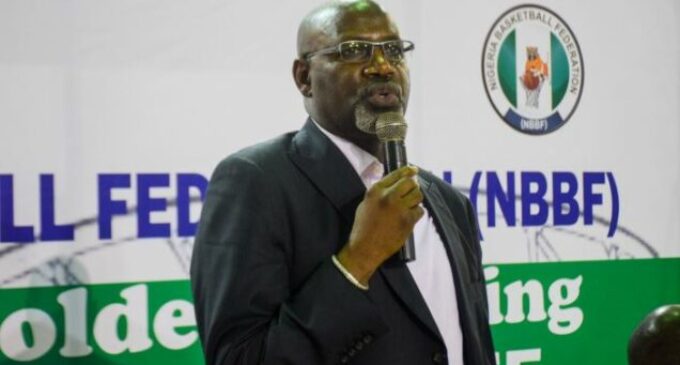
Sports, particularly football, is the foremost unifier of the ever-divided Nigerians. Whenever Nigeria plays, Nigerians bury their differences of religion, ethnicity, and region and come together as just Nigerians to support the national team. Over the last few years, basketball has joined football in this regard following the exploits of Nigeria’s D’Tigers and D’Tigress – the male and female national basketball teams, respectively – around Africa and the world. However, these exploits are being reduced to nothing following the crises that have engulfed the Nigeria Basketball Federation (NBBF). This is unfortunate and Nigerians need to know the facts.
Although the NBBF as currently structured was birthed with defects that made crises within its fold inevitable, the ongoing crisis resulting from the clash between two groups in the Nigerian basketball space – one that favours life presidency of the federation and another that favours a maximum of two, four-year terms – are avoidable.
These groups are centred around two outstanding Nigerians who have both made indelible strides in the management and development of basketball in Nigeria. The first group which favours a life NBBF presidency is headed by Tijjani Umar who was a two-term NBBF president between 2009 and 2017 and is currently a permanent secretary in the Presidential Villa.
The other group, which is opposed to life presidency and supports the constitutionally-limited two-term four-year presidency, is headed by Musa Kida, the immediate past one-term NBBF president (2017 – 2021) and its current caretaker committee chairman. Kida was also the deputy managing director of Total Energies Nigeria and is currently its non-executive director.
The crisis has caused the ministry of sports to postpone the federation’s planned October 30, 2021, extraordinary congress in Benin City to elect its new leaders in which both Umar and Kida were expected to vie for presidency if the federation’s constitution allowed it. The ostensible reason for the postponement is that there is a leadership tussle within the NBBF as the Umar group does not recognize the Kida presidency and the NBBF constitution that will guide the electoral processes.
How the Crisis Began
In 2009, the NBBF had no constitution and the federal government appointed Umar as the federation’s president. He served diligently up to 2013 when he sought re-election. The federation still had no constitution, but the ministry of sports under Bolaji Abdullahi, in conjunction with the International Basketball Federation (FIBA), had drawn up guidelines for the election. FIBA is to basketball what FIFA is to football. It is an association of national organizations which governs the sport of basketball worldwide.
Kida, a member of the FIBA finance committee, decided to challenge the incumbent president and a week to the election had garnered the support of the delegates representing four out of six zones. With this zonal support, Kida needed the extra support of only two more delegates from the representatives of other stakeholders to win the six out of the 11 votes to be cast as mandated by the electoral guidelines.
On the eve of the election, what happened was both dramatic and defining. Forces in the ministry of sports removed the names of two delegates. One of them, Moses Jituboh, the security officer to former President Goodluck Jonathan, was transferred to the Chess Federation. Jituboh, now an assistant inspector-general of police, represented the armed forces/paramilitary stake in basketball and was a Kida supporter.
The other delegate, Col. Sam Amedu (rtd), also a Kida supporter was, a day to the election, “disqualified” from voting. Amedu is the president and proprietor of the Warriors Program which has a male basketball team called the Dodan Warriors, a female team called the Amazons, along with an academy. He is also currently president of FIBA Africa Zone 3 and a member of the FIBA Africa central board. He was replaced with one Patrick Omorodion, a sports journalist supportive of Umar. FIBA reportedly was mad about the development.
After the election was conducted, Umar won effortlessly, but Amedu filed a case against the conduct of the election before the Nigeria Olympic Committee (NOC). The NOC reportedly delayed hearing the case and wrote a letter to Amedu advising him to go to court. Although it was finally acknowledged that Amedu had a case, the court ruled that the case was statute-barred.
By 2015 when President Muhammadu Buhari administration appointed Solomon Dalung as its first minister of sports, the NBBF was not the only federation in a quagmire. Almost all the federations had no constitution. Dalung then set up a sports reform committee to come up with a viable framework on how the sports federations in the country should be conducting their affairs, including elections. The reform committee came up with its report and submitted it to the minister.
The 2017 NBBF election
In its report to the minister, the reform committee recommended that all the 36 states of the federation and Abuja, instead of only 11 delegates, should be directly involved in voting in the federation’s elections. The ministry adopted this recommendation and directed all federations to draft a new constitution. In January 2017, Umar the serving NBBF president, about three months to the end of his second and final term, secured a five-year $2.5 million annual sponsorship of our local basketball league amounting to a total of $12.5million by Kwese, a South African communications company.
According to contract and confirmation documents from Kwese, the first tranche of the sponsorship money amounting to $1.1million was paid directly to Umar and his league management board headed by Olumide Oyedeji in January 2017. Kwese released another $1.1million in July to Umar and the Oyedeji-led board, amounting to a total of $2.2million.
Amidst this Kwese sponsorship deal, Umar called an annual general meeting (AGM) to pass a draft constitution in which was included the life presidency clause. Some of the stakeholders like the chairman of the Benue chapter and president of the zone, the chairman of the Lagos chapter, and four of the five eastern states were locked out of the AGM contrary to the advice by the representatives of the ministry of sports and the NOC. The AGM passed the draft constitution through a voice vote with no recourse to the delegates list.
After the meeting, aggrieved stakeholders petitioned the ministry of sports and FIBA over its conduct and both bodies called on the Umar-led NBBF to reconduct the AGM and allow all stakeholders to participate. Umar declined to heed the call and as a result, both FIBA and the ministry of sports declined to recognise the new constitution.
As the 2017 federations elections approached, the NBBF had no constitution recognised by the FIBA, as such, the ministry organised the NBBF election in Abuja under the supervision of FIBA and the NOC. Kida was returned unopposed as Umar held a parallel congress in Kano, ran for president for a third term using the unapproved constitution, and sent the outcome to FIBA. Given this conundrum, FIBA declined to endorse any of the elections until the issues were resolved but decided to deal with the Kida-led NBBF in the interim. Umar and Kwese, the new South African sponsor of the NBBF League, went to court to bar the Kida-led NBBF from organising any league games claiming that the league belonged to Kwese.
How the 2017 election issues were settled
In 2018, given the pronouncement of the court on the case filed by Umar against the election of Kida stating that only FIBA can determine the genuine leadership of the NBBF, FIBA sent a fact-finding mission to Nigeria. The mission held separate meetings with Umar, the Kida-led NBBF, the ministry of sports, and the NOC and concluded that the crux of the issue was that there was no constitution, in which case the ministry of sports had the right and authority to conduct the federation’s election. Following this conclusion, FIBA recognised the Kida-led NBBF and included his name on its website.
As further validation, when the NOC held its elections in Yola, Adamawa state, FIBA impressed it on the NOC that the legitimate NBBF leadership is the one led by Kida. Subsequently, the NOC allowed the NBBF to participate in the election.
The settlement, however, did not include the issue of $2.2million Kwese endorsement money paid to Umar’s league management board, and despite the successes recorded by both the male and female national teams both in Africa and on the world stage, the Kwese issue hindered the NBBF from repositioning the local league.
Going into the 2021 election
After the settlement, and FIBA’s recognition of Kida as the legitimate president, the NBBF went ahead to draft its constitution but omitted the life presidency clause. The constitution was passed at a meeting by 29 states instead of 24 (which is two-thirds of 36 states plus Abuja needed to form a quorum) in the presence of Dalung himself and the representatives of FIBA and NOC. Umar and his supporters boycotted the meeting citing their nonrecognition of the NBBF leadership, but FIBA recognised the constitution; making it the only document that guides all elections of the NBBF.
With the appointment of Sunday Dare as sports minister, Umar continued to condemn the leadership of the ministry of sports under Dalung and claimed that it “compromised the guidelines” of the 2017 elections. Media reports are awash with his calls on the new minister to review the already established procedure for elections on which, already, the elections of the player and technical representatives were based.
Dare, however, refused to budge and went ahead to endorse the preparations of the NBBF towards the October 30, 2021, elections. Following the ministry’s insistence on maintaining the status quo, accusations of corruption against its leadership and the leadership of the NBBF started appearing in some obscure online news media.
Although both ministry and NBBF leadership have come out to debunk these accusations, a particular accusation to note is that of a fake story planted in one of the online media that the leadership of the NBBF was arrested by the ICPC and questioned for three hours when no such thing ever happened.
In refusing to budge on the calls by Umar, the ministry in a press statement dated September 30, 2021, held that “the NBBF has a constitution recognised by FIBA and this was confirmed again in a recent correspondence with the Nigeria Olympic Committee (NOC) from FIBA. The ministry recognises this and abides by it”.
“This constitution will form the basis of the next elections and the resolution of any conflict that may emanate from it. The constitution cannot be amended by non-congress members.
“The FIBA approved constitution clearly spells out the processes leading to an elective congress. This must be clearly followed through as expected by FIBA.
“The NOC and the federal ministry of youth and sports development (FMYSD) can only supervise and not conduct the elections. The NOC and FMYSD will be observers. FIBA will also be invited as observers.
“Going by the FIBA recognised constitution, the following steps must be taken, leading to the elections: ‘the NBBF president has the power to call for a congress to draw up the electoral process; once the congress is convened, the electoral committee is appointed and approved by the congress; the appeals committee is also put in place with their appointment approved by the congress; the date and venue of the elective congress are picked and approved by the congress; FIBA, NOC and FMYSD are then officially communicated of congress decisions, and are all officially invited to observe the elections; and on election day, the NBBF president and his board will officially hand over proceedings to the electoral committee who then conducts the elections and swears in the winners immediately so as not to create a vacuum’.
“These are the procedures outlined in the NBBF constitution. The ministry will be properly guided along these procedures. Interested parties and stakeholders can look at the areas of the constitution over which they have disagreements and document same while the recognized constitution remains operational.”
Based on these, and in line with the provisions of the NBBF constitution, the federation held an extra-ordinary congress in Abuja on October 9, 2021. The congress, set up an electoral and appeals committee and approved (by 24 ‘Yes’ votes against two ‘No’ votes) Benin City as the venue for the elective congress, also approved to take place on October 30, 2021.
To the shock of the NBBF and FIBA however, a press release from the ministry signed by the permanent secretary postponed the scheduled elective congress citing “leadership tussle”.
Although the ministry has no authority to postpone the elections, the leadership of the NBBF caretaker committee abided by the ministry’s postponement directive to avoid being caught in altercations between the government of its country and FIBA which may lead to the suspension of Nigeria from participation in international basketball competitions.
Views expressed by contributors are strictly personal and not of TheCable.


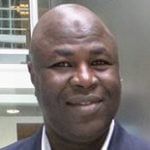




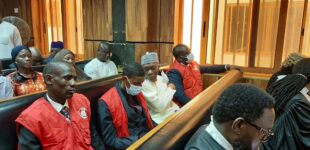

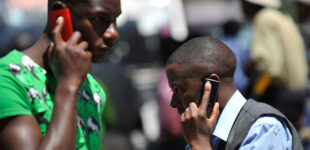
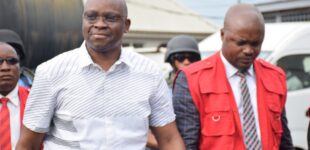
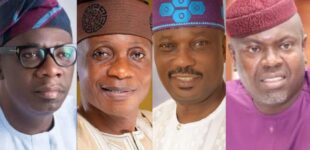
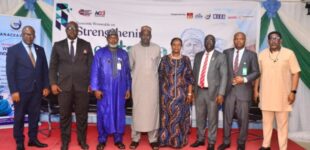



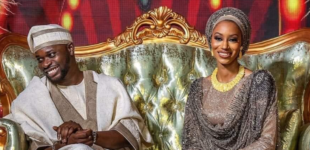

For me, suggesting life presidency is absurd,self soliciting and backward.